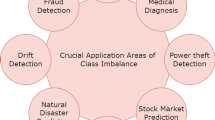
Overview
- Offers a comprehensive review of imbalanced learning widely used worldwide in many real applications, such as fraud detection, disease diagnosis, etc
- Provides the user with the required background and software tools needed to deal with Imbalance data
- Presents the latest advances in the field of learning with imbalanced data, including Big Data applications and non-classical problems, such as semi-supervised learning, multilabel and multi instance learning, and ordinal classification and regression
- Includes case studies
Access this book
Tax calculation will be finalised at checkout
Other ways to access
About this book
This book provides a general and comprehensible overview of imbalanced learning. It contains a formal description of a problem, and focuses on its main features, and the most relevant proposed solutions. Additionally, it considers the different scenarios in Data Science for which the imbalanced classification can create a real challenge.
This book stresses the gap with standard classification tasks by reviewing the case studies and ad-hoc performance metrics that are applied in this area. It also covers the different approaches that have been traditionally applied to address the binary skewed class distribution. Specifically, it reviews cost-sensitive learning, data-level preprocessing methods and algorithm-level solutions, taking also into account those ensemble-learning solutions that embed any of the former alternatives. Furthermore, it focuses on the extension of the problem for multi-class problems, where the former classical methods are no longer to be applied in a straightforward way.This book also focuses on the data intrinsic characteristics that are the main causes which, added to the uneven class distribution, truly hinders the performance of classification algorithms in this scenario. Then, some notes on data reduction are provided in order to understand the advantages related to the use of this type of approaches.
Finally this book introduces some novel areas of study that are gathering a deeper attention on the imbalanced data issue. Specifically, it considers the classification of data streams, non-classical classification problems, and the scalability related to Big Data. Examples of software libraries and modules to address imbalanced classification are provided.
This book is highly suitable for technical professionals, senior undergraduate and graduate students in the areas of data science, computer science and engineering. It will also be useful for scientists and researchers to gain insight on the current developments in this area of study, as well as future research directions.
Similar content being viewed by others
Table of contents (14 chapters)
-
Front Matter
Authors and Affiliations
Accessibility Information
Accessibility information for this book is coming soon. We're working to make it available as quickly as possible. Thank you for your patience.
Bibliographic Information
Book Title: Learning from Imbalanced Data Sets
Authors: Alberto Fernández, Salvador García, Mikel Galar, Ronaldo C. Prati, Bartosz Krawczyk, Francisco Herrera
DOI: https://doi.org/10.1007/978-3-319-98074-4
Publisher: Springer Cham
eBook Packages: Computer Science, Computer Science (R0)
Copyright Information: Springer Nature Switzerland AG 2018
Hardcover ISBN: 978-3-319-98073-7Published: 01 November 2018
Softcover ISBN: 978-3-030-07446-3Published: 19 January 2019
eBook ISBN: 978-3-319-98074-4Published: 22 October 2018
Edition Number: 1
Number of Pages: XVIII, 377
Number of Illustrations: 21 b/w illustrations, 50 illustrations in colour
Topics: Artificial Intelligence, Information Systems and Communication Service, Computer Communication Networks



